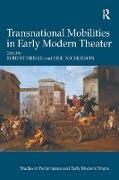Read more
The essays in this volume investigate English, Italian, Spanish, German, Czech, and Bengali early modern theater, placing Shakespeare and his contemporaries in the theatrical contexts of western and central Europe, as well as the Indian sub-continent. Contributors examine the movement of theatrical units, genres, performance practices and dramatic
List of contents
1: Introduction; 1: Systems and Theatergrams; 2: The Taming of the Shrew, Italian Intertexts, and Cultural Mobility; 3: Resources in Common: Shakespeare and Flaminio Scala; 4: “Are You a Comedian?”: The Trunk in Twelfth Night and the Intertheatrical Construction of Character; 2: The Pastoral Zone; 5: Hymen and the Gods on Stage in Shakespeare's As You Like It and Italian Pastoral; 6: Et in Arcadia the Dirty Brides 1; 3: Performance Texts and Costumes; 7: Dido, Boy Diva of Carthage: Marlowe's Dido Tragedy and the Renaissance Actress 1; 8: Forms of Fashion: Material Fabrics, National Characteristics, and the Dramaturgy of Difference on the Early Modern English Stage; 4: Northern and Central European Mobilities; 9: Shakespeare's “portrait of a blinking idiot”: Transnational Reflections 1; 10: English Comedy and Central European Marionette Drama: A Study in Theater Etymology 1; 5: Translation Theory and Practice; 11: Trade in Exile; 12: Found and Lost in Translation; 13: Shakespeare's Untranslatability; 14: Lebedeff, Kendal, Dutt: Three Travelers on the Indian Stage; Epilogue; 15: Early Modern Theater in Motion: The Example of Orpheus
About the author
Robert Henke is Professor of Drama and Comparative Literature at Washington University in St. Louis, USA, and the author of Pastoral Transformations: Italian Tragicomedy and Shakespeare's Late Plays (1997) and Performance and Literature in the Commedia dell'Arte (2002). With M.A. Katritzky, he is the editor of European Theatre Performance Practice, 1580-1750 (Ashgate, 2014). Eric Nicholson is a Lecturer at Syracuse University in Florence, Italy, where he teaches courses on comedy and theater. In Florence and elsewhere he has directed numerous full-scale productions of plays by Shakespeare, Molière, Flaminio Scala, and others. Their previous Ashgate collection is Transnational Exchange in Early Modern Theater (2008).
Summary
The essays in this volume investigate English, Italian, Spanish, German, Czech, and Bengali early modern theater, placing Shakespeare and his contemporaries in the theatrical contexts of western and central Europe, as well as the Indian sub-continent. Contributors examine the movement of theatrical units, genres, performance practices and dramatic

